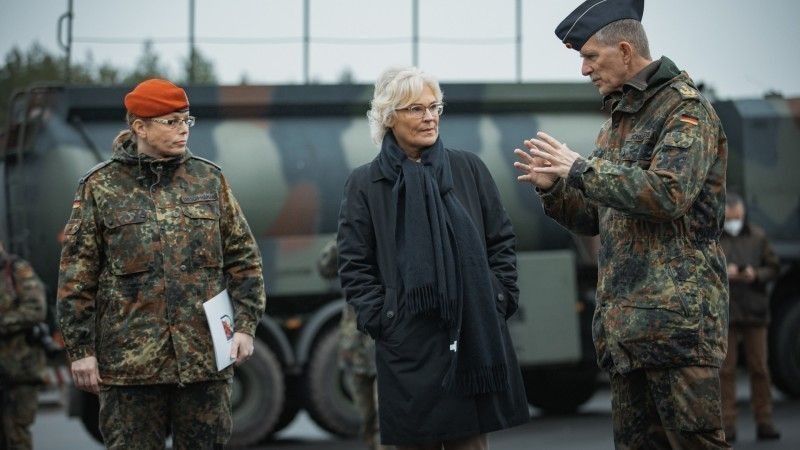Defence Policy
Germany: Head of the MoD Resigns, but that will not help Bundeswehr or the Ukraine Aid [COMMENTARY]

Christine Lambrecht, head of the German MoD, resigned. Some doubts have emerged, about whether the leadership change at the German MoD would resolve the German defence and security problems.
Christine Lambrecht was leading the German MoD since late 2021 when the SPD-Grüne-FDP coalition took the Ministry over from the CDU/CSU-SPD. The German MoD led by Lambrecht was frequently criticized for the slow tempo of modernization in the Bundeswehr, and for slow reaction times, when it comes to the requirements and needs signalled by Ukraine, fighting the Russians.
Circumstances surrounding the Puma IFV's problems also did not go unnoticed, with the legacy Marder vehicles becoming a part of the QRF. Another matter pertained to the lack of coordination between the German Chancellor, and the German MoD, as a decision was made to send Marders to Ukraine. Lambrecht, however, managed to finalize several critical modernization contracts - concerning the F-35 fighters, or elements of the kit used by the individual soldiers.
We do not know for now, who would replace Christine Lambrecht as the head of the German MoD. Eva Hoegl is listed as one of the possible candidates. She is the Bundestag's plenipotentiary dealing with matters tied to the Armed Forces. That scenario would be a positive one since Hoegl was working on the Bundeswehr's problems, and feedback submitted by the soldiers. They, as a "parliamentary army", have a right to submit critique - also targeting the MoD.
One should however remember that the problems that the Bundeswehr is facing, and matters that are concerning in the area of German defence and security, are not caused directly by a specific head of the MoD, Lambrecht included. A major portion of the Federal administration is opposing any dynamic action aimed at reinforcing the German defence, or at supporting the Ukrainians.
The requests for delivery of heavy equipment from Germany are blocked by the Chancellor's office, led by Olaf Scholz, who also happens to be Lambrecht's party colleague. Berlin could have been getting ready to deliver main battle tanks to Ukraine for six years now, or at least from March-April last year when the industry was submitting requests to transfer the legacy Leopard 1 MBTs, and Marder IFVs kept in storage. No work was pursued here, as no relevant decision had been made by Scholz.
If a political decision is finally made, under the pressure of the allies, in January for instance, then, the Ministry of Defence would be blamed for the lack of main battle tanks available ad hoc. However, the political directives at the governmental level did not provide a foundation for the German MoD to handle the matters of delivering such equipment to Ukraine.
Meanwhile, when Lambrecht was requesting funds to be made available, to deliver extra munitions, the initiative was blocked by the Ministry of Finances, led by Christian Lindner (FDP). He noted that the procurement of munitions should be covered with the use of the extra fund worth EUR 100 bn., established by the government with an intent to restore the Bundeswehr's capabilities. The Fund in question, however, refers to long-term programmes, such as the F-35 procurement, European sixth-generation fighter development, or IADS. It is not expected to be used to meet the ongoing requirements defined by Bundeswehr. And the use of that fund has already been planned - more money is needed, as meeting the ongoing requirements, and implementation of long-term ideas shall not be competing domains. The political will is missing when it comes to spending nonetheless - even at a cost of a minor budget deficit increase. The question here is whether the MoD should be blamed for that - or do other departments of the administration have their say here?
Lambrecht herself declared, following her resignation, that the media attention focused on her makes it impossible to properly inform the public, maintain a healthy discourse on the Bundeswehr, or discuss the German defence and security policy. She stated that the soldiers and their service shall be placed at the centre of attention. This somewhat confirms the fact that Lambrecht's scope of influence is limited. That does not mean that she does not bear responsibility for what was happening at the Ministry. However, it shows that the foundations of the Bundeswehr are placed outside the Ministry of Defence, while the Ministry itself is unable, or cannot shape the defence policy in a broader sense.
In other words, German politicians, due to a variety of reasons, are not ready to deepen their involvement in defence and security to a degree that would adequately match the current threats. Despite the allocation of further funds, there is still not enough money available to meet the needs, due to decades of backlog, especially in the area of land domain conventional defence capabilities.
Decisions leading to a complete liquidation of air defence assets of the mobile land units, and almost a complete resignation from ground-based SHORAD, degraded artillery capabilities (following a complete withdrawal of cluster munitions), cuts in the armoured and mechanized units resulting in a lack of equipment reserves, have all been made a decade ago, or even earlier on. The results of those decisions have not been reversed even today.
Meanwhile, the processes of procurement, and providing military aid to Ukraine are hampered by the bureaucracy and politics across the federal administration, ofter beyond the MoD. Unless the new head of the MoD overcomes that impasse, reaching far beyond what the Ministry does, the Bundeswehr or the German defence and security matters would still have a negative impact on the scale at which military aid is delivered to Ukraine, or on the establishment of the NATO defensive capabilities.
